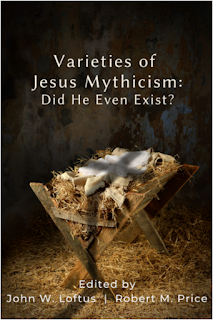Carrier recently reviewed our mythicist book. He liked some chapters and trashed some others. So I wrote a defense of it, LINK. He did write a blurb for our book though:
Mainstream experts mostly already agree the miraculous Jesus didn’t exist, but what about a merely human Jesus? This anthology usefully exhibits the full gamut of doubting even that, from the absurd to the sound. Some contributions are not credible, but some are worth considering, and several are brilliant, indeed required reading for anyone exploring the subject. The book will be absolutely necessary for any future Jesus mythicist scholar. - Dr. Richard Carrier, peer-reviewed author of On the Historicity of Jesus.Having previously been called a "doofus" when it comes to Bayes Theorem, I know the sting of a review by Carrier. In my defense I myself had a peer-reviewed paper published on Bayes Theorem at Internet Infidels, where the vice-President said it was one of the best papers he ever had the pleasure of reading and approving! Carrier still has not responded to it, but if he does, he may overwhelm me with words and links galore, burying me in so much work I won't be able to respond to it all, if I do. Yet, I'm sure I have basically refuted his case. No, Bayes is not the tool for assessing miraculous claims, which by their very nature are impossible to take place in the natural world, by means of the natural world. I have argued that Bayes cannot and should not be applied to claims which are nonsense, and that miraculous claims in the ancient Biblical past are all nonsense! They are all nonsense because there is absolutely no credible evidence for any of them. Lately I offered some additional thoughts on Bayes.
By the way, I want to know about the peer-review process when it comes to Carrier's book on Jesus. Please tell us Dr. Carrier! If anyone takes a minute to search for it, there are varying methods and goals in peer-review. What is not promised is that the book is setting forth something true and factual. It only means, at best, that an author has dealt with all of the most important objections.
I know that Sheffield Phoenix Press is a highly esteemed scholarly liberal book publisher. I also know publishers want provocative books that sell well (despite any claim otherwise), since money is indeed a factor. This is not to impugn Sheffield Phoenix Press, and its editors, or any of its authors, including Carrier, since it's very significant that a mythicist got a book published by this publisher! [Atheist scholar Hector Avalos also published two books with them]. But peer-review does not mean the particular reviewer (or committee) thinks what Carrier wrote is true. Yes, we should definately read what Carrier writes. We just don't need reminded that his work was peer-reviewed so often, nor does it mean Carrier's particular treatment is the end of all Jesus mythicism studies, or that Carrier gets to be the hall-monitor for every mythicist who writes on the same subject.
As I said in an earlier post, I don't care much at all with how the Jesus character originated. What I know is that the Jesus in the four gospels did not exist. I said so in my Preface. I also said each and every one of the theories presented in the book are possible. That's my starting point. Possibility is good enough.
With that in mind I'm posting what Joe Atwill sent me in response to Carrier. I did not solicit it, but I welcome it.
The Elephant in Richard Carrier’s Room: A Lesson for NT Scholarship
By Joseph Atwill
Richard Carrier has written a critique of two of the parallels I discussed in the chapter I wrote for "Varieties of Jesus Mythicism." SOURCE I wish to respond.













.jpg)








